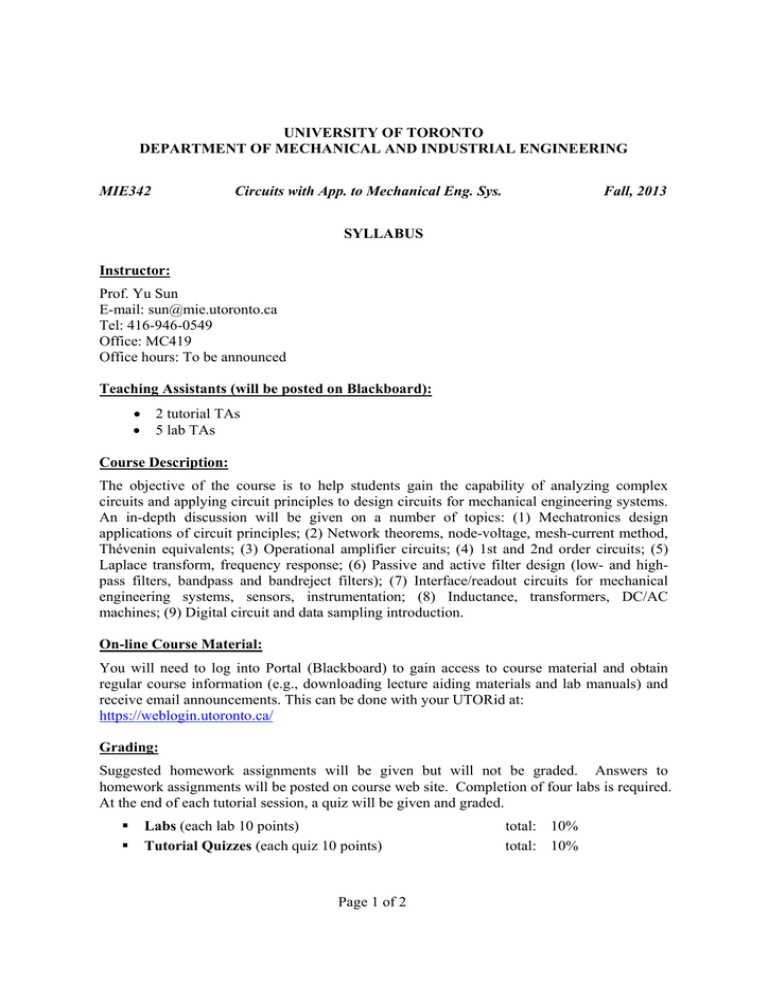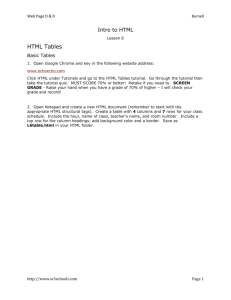
UNIVERSITY OF TORONTO
DEPARTMENT OF MECHANICAL AND INDUSTRIAL ENGINEERING
MIE342
Circuits with App. to Mechanical Eng. Sys.
Fall, 2013
SYLLABUS
Instructor:
Prof. Yu Sun
E-mail: sun@mie.utoronto.ca
Tel: 416-946-0549
Office: MC419
Office hours: To be announced
Teaching Assistants (will be posted on Blackboard):
2 tutorial TAs
5 lab TAs
Course Description:
The objective of the course is to help students gain the capability of analyzing complex
circuits and applying circuit principles to design circuits for mechanical engineering systems.
An in-depth discussion will be given on a number of topics: (1) Mechatronics design
applications of circuit principles; (2) Network theorems, node-voltage, mesh-current method,
Thévenin equivalents; (3) Operational amplifier circuits; (4) 1st and 2nd order circuits; (5)
Laplace transform, frequency response; (6) Passive and active filter design (low- and highpass filters, bandpass and bandreject filters); (7) Interface/readout circuits for mechanical
engineering systems, sensors, instrumentation; (8) Inductance, transformers, DC/AC
machines; (9) Digital circuit and data sampling introduction.
On-line Course Material:
You will need to log into Portal (Blackboard) to gain access to course material and obtain
regular course information (e.g., downloading lecture aiding materials and lab manuals) and
receive email announcements. This can be done with your UTORid at:
https://weblogin.utoronto.ca/
Grading:
Suggested homework assignments will be given but will not be graded. Answers to
homework assignments will be posted on course web site. Completion of four labs is required.
At the end of each tutorial session, a quiz will be given and graded.
Labs (each lab 10 points)
Tutorial Quizzes (each quiz 10 points)
Page 1 of 2
total: 10%
total: 10%
Midterm Exam (100 points, closed-book, Type A)
Final Exam (100 points, closed-book, Type A)
total: 30%
total: 50%
Required Textbook:
Electric Circuits (9th edition), James W. Nilsson and Susan A. Riedel, Pearson
Prentice Hall.
Chapter 1 – 15 with added examples and materials
Lab and Tutorial Schedule:
A complete lab and tutorial schedule will be given in a separate file.
Information on Laboratories:
Lab Contents:
1) Lab 1: DC Motor Characteristics
2) Lab 2: Op-Amp Circuits
3) Lab 3: Strain Gauges and Instrumentation Amplifier Circuits
4) Lab 4: Gasoline Volume Measurement and Active Filtering
Lab Manual: lab manuals for the four labs will be posted at the course web site.
Lab Groups: two students/group (to be chosen by students).
Lab Safety: follow lab rules and TA instructions.
Lab Reports: 10 points.
For each lab, a pre-lab report (5 points) will be submitted individually. Pre-lab
reports will be collected in the beginning of the lab. You are responsible for
making a copy for lab use.
For each lab, a single post-lab report (5 points) per group will be submitted.
Post-lab reports will be due at the beginning of the next lab. The last lab will be
due on the last day of lecture.
No late reports including pre-lab and post-lab reports will be accepted. A grade
of zero will be given for late lab reports.
Information on Tutorials:
Tutorial Style: Tutorials will be given by a TA. Examples will be discussed, and
representative problems will be solved.
Quizzes: All tutorials except the PSpice tutorial will have a short quiz at the end, of
approximately 20-30 minutes duration.
Mid-Term and Final Exam (both closed-book):
Both midterm and final exams will be closed-book (Type A).
o No aid sheets will be allowed.
o Non-programmable calculators are allowed. Storing aid information in
calculators is forbidden.
Page 2 of 2


